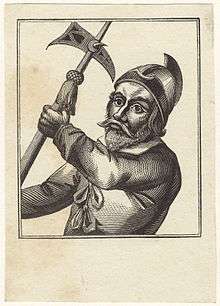Thomas Venner

Thomas Venner (died 19 January 1661) was a cooper and rebel who became the last leader of the Fifth Monarchy Men, who tried unsuccessfully to overthrow Oliver Cromwell in 1657, and subsequently led a coup in London against the newly restored government of Charles II. This event, known as "Venner's Rising", lasted four days (1–4 January 1661) before the Royal authorities captured the rebels. The rebel leadership suffered execution on 19 January 1661.
Venner had moved to New England in 1637 and stayed for 22 years before returning to plot against Cromwell. He assumed leadership of the Fifth Monarchists after the execution of General Thomas Harrison at Charing Cross on 19 October 1660. Venner led a congregation, which included New Model Army veterans, that met in a rented room above a tavern in Swan's Alley off Coleman Street.

On Sunday 1 January 1661 he led a number of his men – Samuel Pepys said they later turned out to be only 50 although it had been thought they were 500 at first – to a bookseller called Mr. Johnson at St. Paul's to demand the Cathedral keys. On being refused they broke in and accosted passers-by asking who they were for. One answered "King Charles" and they shot him through the heart. A number of musketeers sent to dislodge them were beaten back and a troop of the Trained Bands under the Lord Mayor Major General Sir Richard Browne attacked them and they retreated to Ken Wood near Highgate.
On the Wednesday they attacked again at Wood Street and Threadneedle Street forcing the King's Life Guard of Foot (a force of 1200 men commanded by John Russell) to retreat. They then attempted to storm the Comptor Prison to liberate the inmates in order to join them, but were repulsed in fierce fighting. Venner is said to have killed three men with a halberd in Threadneedle Street.
A force of General Monck's men under Colonel Cox pursued them to their last stands in the Helmet Tavern on Threadneedle Street and the Blue Anchor on Coleman Street. Royalist troops broke through the clay roof tiles with musket butts and fired upon the wounded defenders, breaking in through the ceiling. Venner was captured after being wounded nineteen times. Others were shot out of hand.
He was put on trial at the Old Bailey and hanged, drawn and quartered on 19 January 1661. According to Tobias Smollett, Venner and his followers "affirmed to the last that if they had been deceived, the Lord himself was their deceiver".[1]
Family
Venner's son, Thomas joined him in the Rising.
Thomas's son, Colonel Samuel Venner led the Duke of Monmouth's cavalry and was shot and wounded by a sniper in Bridport, but survived until 1712.
Samuel's daughter Elizabeth married a linen draper's son named John Potter who became Archbishop of Canterbury.
References
- ↑ Tobias Smollett – A Complete History of England Book VII Chap.1 p406
External links
- The Diary of Samuel Pepys Saturday 19 January 1661
- Fifth Monarchists or Fifth Monarchy Men
- Works by or about Thomas Venner in libraries (WorldCat catalog)